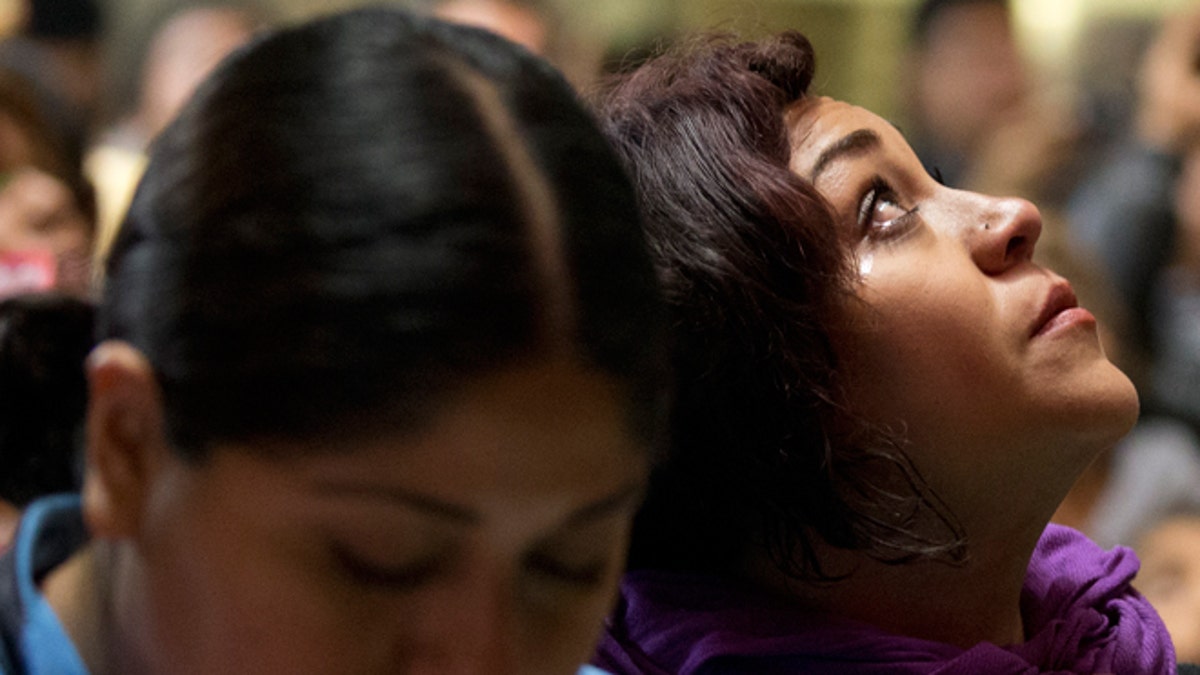
Dec. 12, 2014: A tear runs from the eye of a pilgrim as she looks up at the apron of Juan Diego, a 16th century relic believed to hold the imprint of the Virgin of Guadalupe, in Mexico City. Every year hundreds of thousands of people from across the country, many carrying images or statues of Mexico's patron saint to be blessed, converge at the Basilica on Dec. 12, the Virgin's feast day. Pilgrims are able to view the apron from moving walkways that pass below. (AP Photo/Rebecca Blackwell)
While in seminary, I ran across the author Henri Nouwen, who articulated the tension—or paradox—of faith as well as anyone I have read.
His answer, unlike most I have heard, does not whitewash the messiness of life or explain away the mystery of God. Rather, Nouwen wrote that an essential part of life is learning to “live the questions” faith engenders.
To wait on the Lord.
To pray our pain.
To accept confusion.
Nouwen’s answer resonates with the honest picture of faith I see in Scripture. Life is, as stated by my Old Testament professor, relentlessly difficult.
[pullquote]
Jesus promised suffering in Matthew 16:24, and as testified in Scripture, those most clearly called by God and most definitively used by God often are given the most challenging circumstances.
Life is messy. God is mysterious. And accepting this tension-filled truth, no matter the circumstances, is the pathway to peace.
This holiday season, I find myself struggling to accept this as much as I have in a long time and to ground myself once again in “living the question.”
My heart hurts with the brokenness, pain and anger that characterize race issues in America and the tilted scales of justice so many experience.
My mind shuts down over global issues of war, terror and gender violence at the root of so much injustice in the world.
My soul aches for the man who called today about his nephew shot in Afghanistan, the biopsy report I received yesterday of a mother from church and the father who passed away today leaving behind a son and daughter both under the age of three—who will never have a concrete memory of their dad.
One of the things that typifies being a child is that you are often sheltered from the weather outside—from the scary, the messy and the sheer magnitude of evil and suffering.
When, as an adult, I find myself wanting to whitewash the issues, push them down below my conscious thoughts, or squeeze them out with holiday shopping and movie watching, I realize I’m simply wishing to be a child again.
The will to hide from the world.
Saint Paul said, “When I was a child, I talked like a child, I thought like a child, I reasoned like a child. When I became a man, I put the ways of childhood behind me.”
I’m struggling. I know others are struggling. I know many are struggling far greater than I.
Choosing faith, despite the messiness of life and the mystery of God, however, is the essence of biblical trust. It is the faith in the “not yet” of many of God’s promises about His reign of justice and commitment that every tear shall be wiped away.
Paul continues, “For now we see only a reflection as in a mirror; then we shall see face to face. Now I know in part; then I shall know fully, even as I am fully known. And now these three remain: faith, hope and love… but the greatest of these is love.”
Life is relentlessly difficult.
As we grow older and grow up, as Christians, we can’t shrink from pain, we can’t gloss over the struggle of others in order to maintain our illusions and distance, we can’t hide or pretend.
But the term Advent points to the coming of Christ into the world. The one bringing peace to the world was needed then as now.
Ours is to engage.
Ours is to stand together in solidarity.
Ours is to suffer forward (is that not what biblical faith is?).
Ours is, as Nouwen said, “to learn to live the questions.”
And ours is to lament with the Psalmist crying, “Come, Lord! Come.”
